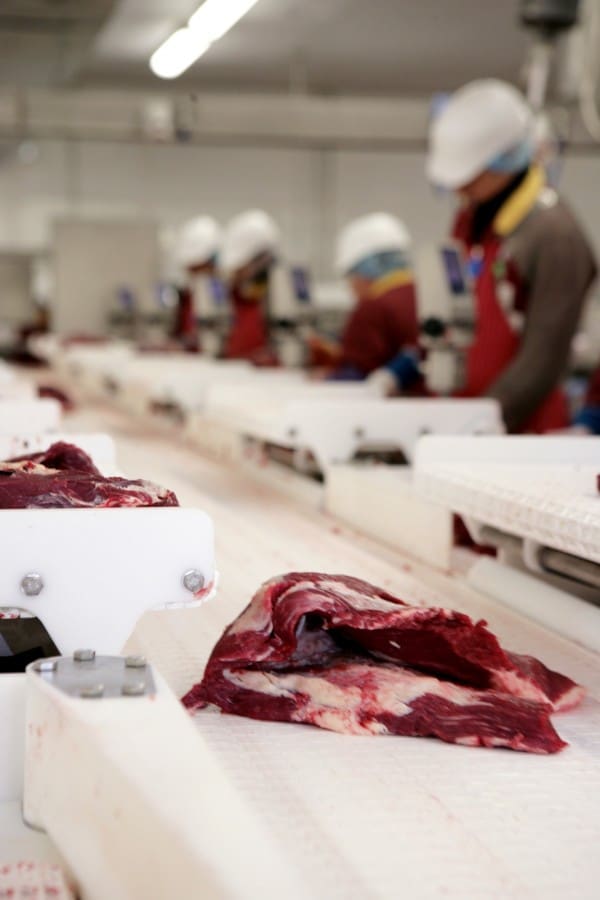THE red meat supply chain must be careful not to add additional regulatory burden in responding to issues raised in the Australian Competition and Consumer Commission’s Cattle and Beef Market Study, red meat processors said this week.
While generally in support of many of the findings contained within ACCC’s 15 recommendations put forward in its Cattle and Beef Market Study, the Australian Meat Processor Corporation takes issue with several areas of the report, seen as needed to address strategic risks in the industry.
In communication with processor members this week, chairman Peter Noble provided AMPC’s take on the ACCC’s final recommendations following its recently completed market study (click here to view earlier story).

Peter Noble
Mr Noble said the ACCC’s recommendations generally reflected that the beef industry is a vibrant and competitive marketplace, giving producers differing options for price discovery, ranging from direct to processor sales, sales via the saleyard system, sales to re-stockers and feedlots, and sales to the live export trade.
“The industry functions well and does not require additional regulatory interventions that would undermine its efficiency and cost competitiveness,” Mr Noble told AMPC members.
Such unwarranted interventions could result in an increased cost burden and a reduction in employment (primarily in regional areas where most beef processors are located) as well as reduce demand for Australian beef, and ultimately livestock from producers, he warned.
Increased processing costs would arguably lead to the potential for meat manufacturing jobs moving overseas.
Transport distances part of competition equation
The ACCC’s willingness to consider information provided by processors that cattle are regularly transported long distances (over 400km) to meatworks was a pleasing outcome.
“This effectively expands the geographic definition of markets for the acquisition of cattle – a necessary factor for consideration in the ongoing competitiveness and economic sustainability of the industry,” Mr Noble said.
He said the ACCC’s appreciation of the need for flexibility in market definition was another welcome step, consistent with the industry’s perspective on the competitive and regulatory environment risks facing the sector.
Mandatory price reporting
AMPC supported the ACCC’s position in not recommending mandatory price reporting, given the potentially unintended adverse impacts that it could lead to, such as price signalling, Mr Noble said.
“Signalling prices to meat buyers in a concentrated market can prompt a ‘race to the bottom’ in pricing, which would unfavourably impact livestock producers as well as processors.”
He said AMPC was committed to undertaking R&D programs that could enable more price-accurate information to be disseminated in a manner that is cost-efficient for industry.
Objective carcase measurement no panacea
 AMPC also welcomed the ACCC’s recommendation that objective carcase measurement technology should be prioritised by the industry.
AMPC also welcomed the ACCC’s recommendation that objective carcase measurement technology should be prioritised by the industry.
“The AMPC has already committed more than $6 million toward exploring the technology which demonstrates our focus on this area of opportunity. However, both AMPC and the ACCC are aligned in acknowledging that the technology is not a panacea for the complex issues surrounding objective carcase measurement and price transparency, nor the myriad of challenges facing the industry,” Mr Noble said.
“The adoption of any technology must be a commercial decision for individual processors. In a competitive commercial environment, this decision will be determined by the cost benefits of the technology for the individual processor concerned, like any other technology.”
To enforce the adoption of any technology could only lead to increased processing costs and thereby add to the competitive risks already facing the industry from countries of lower labour cost like Brazil and India, he warned.
For this reason, the AMPC had commissioned an independent study to help the industry make informed commercial choices before adopting the proposed technology. The findings from the independent review will be released next month.
“The thoughtfulness required around the introduction of DEXA technology to support objective carcase measurement was echoed by Queensland Senator Barry O’Sullivan who recently visited the Scott Technology site to see the technology first-hand. He has now indicated an intention to see the results of the independent study before calling for widespread adoption.”
“Senator O’Sullivan said the industry needed to be careful that the introduction of the technology was transitional – that is to say it allows the production sector time to make necessary adjustments in supply, so it isn’t akin to jumping into a swimming pool full of ice,” Mr Noble said.
Grading audits, dispute resolution process areas for concern
Notwithstanding the AMPC’s general support for the ACCC report, there were several areas which were inconsistent with processors’ perspectives, on actions that were needed to address strategic risks in the industry, he said.
“For example, a major risk identified above is the regulatory environment. Red meat processors are especially exposed to the impact of regulatory costs which are beyond their control.”
There were several recommendations made by the ACCC that would potentially add to regulatory costs, and where the benefits to processors and producers were as yet unquantified, and remain unclear, Mr Noble said.
“In particular, the recommendation relating to additional carcase grading audits has been made mention by the ACCC without demonstrating the net benefits and their incidence.”
“Similarly, the ACCC’s recommendation for the introduction of a uniform dispute resolution system will again add costs to the industry – without any supporting evidence being provided on the incidence of such complaints, and why a mandatory system is preferred to the implied competition between processors in resolving their complaints and handling procedures,” he said.
“The AMPC has taken the initiative in addressing the strategic risks facing the industry. In relation to the regulatory environment, it has commissioned research on regulatory costs released in November 2016. The AMPC has also taken the industry initiative of addressing the competition risks facing the industry, having also commissioned research on the comparative operating costs of meat processing internationally to bring these issues to light.”
Mr Noble said overall, the ACCC’s recommendations reflected AMPC’s own perspectives on the need to avoid regulatory interventions that add unnecessary cost burden to the industry, and instead enable it to achieve continued productivity and employment opportunities for the benefit of all participants in the value chain.
“As encouraged by the ACCC, AMPC is committed to working directly with the Red Meat Advisory Council on a number of these recommendations, and believes it can play a valuable role in investigating solutions that deliver a more efficient, transparent and ultimately sustainable industry through its R&D programs,” he said.



HAVE YOUR SAY